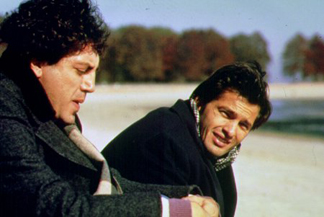Inner Life
Before Night Falls compelling sophomore followup to Basquiat
By Mario M. Muller

It’s not a wonderful life: Oscar nominated Bardem portraying Arenas
Javier Bardem, in his Oscar-nominated performance, portrays gay Cuban poet Reinaldo Arenas as an intuitive man of the soul in the portrait film entitled Before Night Falls. The film concentrates on the tumultuous first half of Arenas' life, first as a poverty stricken youth in a desolate countryside outside of Havana, and second as a struggling man of letters beleaguered by the oppressive Castro regime.
Bad-boy-painter turned biopic-art-house-film-maker, Julian Schnabel, paints the filmic likeness of the striving poet in the widest of all possible strokes; yet he achieves empathy without sinking into saccharine. At times, the visuals of Arenas' bleak rural upbringing fall this close to a "Save The Children" campaign on late night television. But rather than hearing the plaintive and impassioned pleas by Sally Struthers for donations, we hear Bardem's lilting recollections laced always with the urgent and evocative strains of poetry.
These narrative passages are performed verbatim from Arenas' writing, and they act as an emotional anchor. Schnabel's use of emotive visuals coupled with lyrical voiceovers and the syncopated rhythms of Cuban salsa music give the film an unparalleled visual distinction.
Indeed, it is Bardem's voice and strong physical presence that carry the film. As a young man aching to find both his voice in writing and his sexual identity, Bardem nails the softness of the poet's soul, and the conviction that it takes to write from one's heart in an environment of judgment and paranoia. Soon after arriving in Havana, young Arenas finds the kindred spirits and community that he so desires. The political landscape is Cuba of the early and mid 1960s and all the naiveté that accompanies the false promise of communist revolution. The scenes of this era are all bathed in the warm tropical light of a Caribbean afternoon and the film stock that Schnabel chooses dovetails effortlessly with the vintage newsreel footage he weaves throughout for authenticity.
Being a homosexual and a writer of unflattering honesty is, of course, a double threat to a dictatorship based on conformity and political dogma. Arenas soon finds himself persecuted and jailed for false accusations. The nobility of Arenas' character lies in his ability not only to survive the humiliating conditions of his incarceration, but also to find the discipline to write a novel and have it smuggled out. Simply stated it is the story of temporary triumph over the scarring embers of despair.
Some of the more jarring and chilling filmic moments are fantasy sequences, which initially play out like the truth before the film snaps one back to reality. It is easy to understand that survival comes in the form of imagination.
Arenas is eventually released and returns to the underground-closeted life of dual appearances. These are trepidatious times for the poet, who it seems is always under surveillance. Dreams of escape are not limited to time spent in a physical jail.
Arenas did escape Cuba with some fortuitous luck during the Mariano Boat lift of 1979 where Castro released "undesirables" like convicts, felons, and homosexuals to American shores. The scene of Arenas expectantly gazing through the chain link fence of the immigration holding area in Miami is only marred by the chuckling prospect that the camera might pan across to find Al Pacino as Tony Motola in the opening scenes of Brian DePalma's Scarface.
The last 14 years of the exiled man-of-no-land poet in New York is regrettably barely covered, and we quickly flash forward to Arenas' last days as a victim of the dreaded AIDS virus. Once again, Bardem pulls out all the emotional stops, yet he and Schnabel rest heartbreakingly short of melodrama.
The film is literally strewn with marvelous supporting actors who each contribute to the films' documentary-like genuineness. There are delightful cameos by Sean Penn and Johnny Depp, which, if one is not attentively searching for, can go completely unnoticed. With Basquiat and Before Night Falls, Schnabel has proven that he has a lock on revealing the hidden motivations and complex struggles of an artist's life.
HOME | THIS ISSUE | ACE ARCHIVES